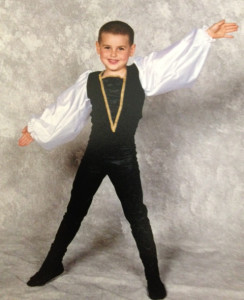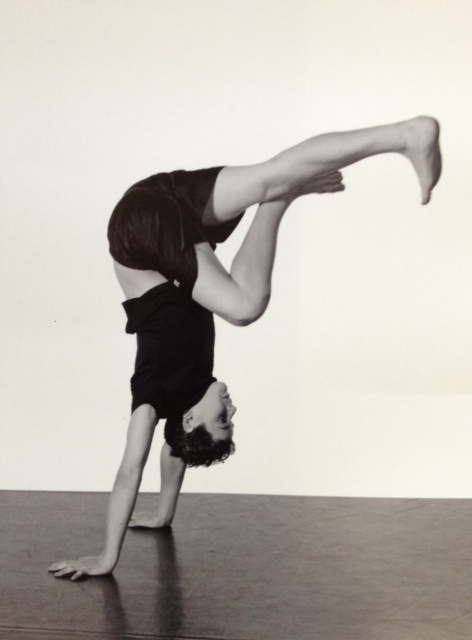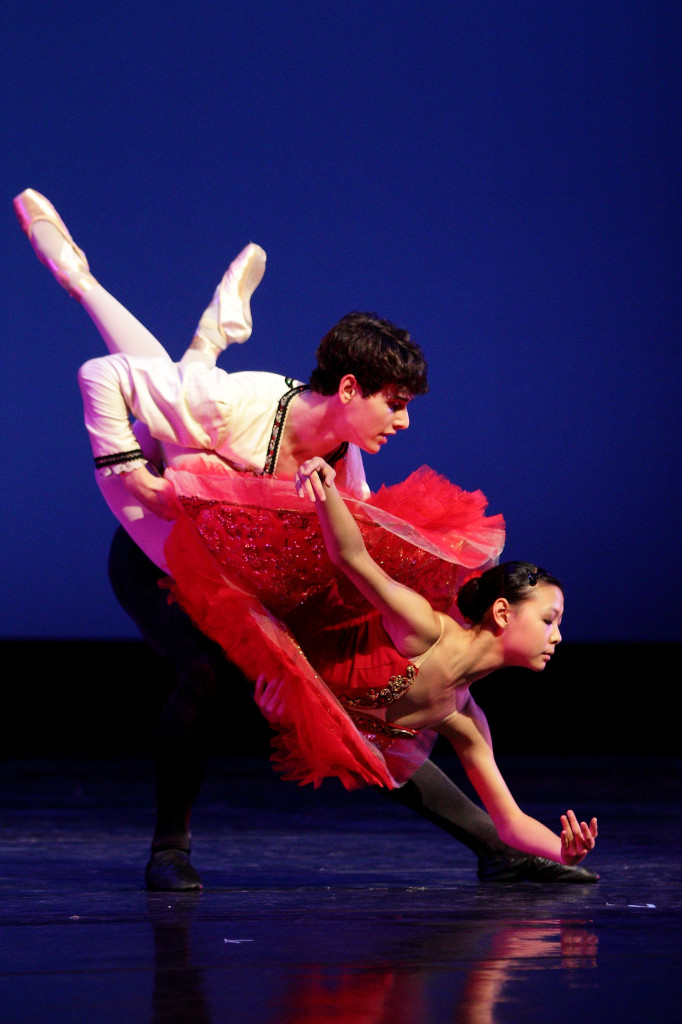 As a father of a dancin’ boy, my wife asked me to write a blog post from a dad’s perspective on why fathers should support sons when they show an interest in becoming dancers. Here are my thoughts on that subject.
As a father of a dancin’ boy, my wife asked me to write a blog post from a dad’s perspective on why fathers should support sons when they show an interest in becoming dancers. Here are my thoughts on that subject.
I believe that a primary aspect of a parent’s job is to raise their children so they can fulfill their lives’ calling and/or pursue their passion, thus creating a life of meaning. To do this usually requires exposure to many different experiences and endeavors. That means a parent must be open to children exploring things that interest them as they grow up, even if it is outside a parent’s comfort zone. (The caveat being that these things should not be illegal or detrimental to them or to others, and dance certainly does not fall into this category.) So, as a father you do your job, be the grown up, set a good example, and support your son’s interests even if they happen to be something that is unfamiliar to you or makes you a bit uncomfortable.
Open Your Mind, Open Your Heart
Fathers so often seem to have a set idea of what they want to see in their sons. (I know that I am now stereotyping, but it fits with those who do not support sons that dance. Therefore, I will take the license I am granted as the opinionated writer.) The importance and prestige of sports is so ingrained in our society, and the football, basketball, baseball, or soccer star is highly sought and valued—especially by most fathers. However, virtually no one equates the athletic skills necessary for those sports with what it takes to become a great dancer. Many fathers just look at the stereotype of a dancer, especially a ballet dancer—effeminate, gay, weak, not tough, a sissy, etc., etc., etc. This perception demonstrates ignorance and lack of understanding of what it really takes to become a professional dancer.
My son is one of the most gifted athletes I have ever known or seen. He could have done anything—played any sport of his choice—and been among the elite. If he had focused on a sport as much as he did on his dancing, he could have played division 1 soccer, baseball, or lacrosse, though he is probably too small for football or basketball. And yet, he chose to dance, and he will be one of the very few that makes it into the professional ranks of his chosen athletic endeavor.
He Needs Your Support, It’s A Tough Road
Julian was lucky. He had the full and unquestioned support of both of his parents. Even though I grew up loving soccer and playing in both high school and college, I totally supported his choice from the beginning. He chose dancing over soccer, and I was sad to not see him play any longer, but I was happy to see him dance. With the amount of grief he withstood from his peers for his choice it was a good thing he did have my support. He has told me directly how important it was for his primary male role model to show and tell him it was okay to pursue dance. With all the harassment he endured from kids in middle and high school (and even occasionally in elementary school), it is possible that my strong disapproval would have been too much and may have driven him to quit what I knew to be his passion.
A father’s disapproval would certainly be a stunting message to convey to your child! Your son’s passion is not as important as your prejudices.
 I wanted Julian to pursue his passion—something he loved and that meant more to him than anything else in the world. To become a dancer, especially a professional one as Julian has done, one must love it and virtually not be able to live without it. It requires so much sacrifice—growing up, if you are serious, you give up most other sports, many social events, and endure the teasing, name-calling, bullying, and lack of friends because of this choice; as a young person you must put up with even more severe harassment from peers, possibly giving up a semblance of a normal teenagers life if you opt for home-schooling (not our choice with Julian) so more time can be spent on dance, spending 20 or more hours per week in the studio, seven days per week, three hours per day, and often having to drive long distances to attend the best dance schools, giving up friends, weekends, sporting events at school, and often, if they are good enough, leaving their families to attend one of the top dance schools in a far off city that provides them the best opportunity to succeed at their passion. Then, even for men, at this elite level the competition is so stiff that after all the hard work, dedication, passion, and sacrifice, a job may not be forth coming. There are so few positions. An artistic director may not see in your son’s dancing what he or she wants or needs. What a disappointment, especially since this comes after your son has made it to this point put in all that hard work, sacrifice and the fact that physically his body has held up that long.
I wanted Julian to pursue his passion—something he loved and that meant more to him than anything else in the world. To become a dancer, especially a professional one as Julian has done, one must love it and virtually not be able to live without it. It requires so much sacrifice—growing up, if you are serious, you give up most other sports, many social events, and endure the teasing, name-calling, bullying, and lack of friends because of this choice; as a young person you must put up with even more severe harassment from peers, possibly giving up a semblance of a normal teenagers life if you opt for home-schooling (not our choice with Julian) so more time can be spent on dance, spending 20 or more hours per week in the studio, seven days per week, three hours per day, and often having to drive long distances to attend the best dance schools, giving up friends, weekends, sporting events at school, and often, if they are good enough, leaving their families to attend one of the top dance schools in a far off city that provides them the best opportunity to succeed at their passion. Then, even for men, at this elite level the competition is so stiff that after all the hard work, dedication, passion, and sacrifice, a job may not be forth coming. There are so few positions. An artistic director may not see in your son’s dancing what he or she wants or needs. What a disappointment, especially since this comes after your son has made it to this point put in all that hard work, sacrifice and the fact that physically his body has held up that long.
Indeed, dancing is so hard on the body. As a dancer grows up and becomes more serious, he begins to specialize in a type of dance so he can begin getting recognized in that style. He may go to class or rehearsal six to seven days per week during the school year (September – June) with just a week or two off during this period. He works to perfect technique, to learn more, to get more exposure, to not fall behind someone else willing to work even harder. All of this includes doing the same moves over and over and over to perfect them, risking overuse and repetitive motion injuries. Then there is the pressure to jump higher, execute more turns, lift girls more often and higher. The classes and search for perfection never ends, and the mirror at the front of the class only shows the flaws.
So What’s Not To Like (Admire)
In the midst of having to be incredibly dedicated and focused, a male dancer has to also be an incredible athlete—to press girls over their heads, jump incredibly high, show amazing balance, display near perfect technique, develop a superior physique, and be graceful and poised as well as an artist. So what is there not to admire about this endeavor? What is there in this activity a young male dancer—your son—has chosen that is not amazing?
I find it awesome that all of this can be wrapped up in one individual. I cannot understand what there is not to be proud of. I am confounded by fathers who won’t support sons who are willing to do something this hard, willing to sacrifice as much as this endeavor requires, are so athletically gifted, rise to the demands of the art form, and find a way despite the fact that they are males to do it with such delicacy and artistry and to produce astoundingly beautiful and transcendent dance for us to watch.
A Male Dancer Does Not Equate to Gay
What part of a son dancing produces something for which a father would be ashamed? What part is so embarrassing to a father that he would selfishly deny his son the opportunity to possibly find his life’s passion and to give the world his gift?
Are you worried that your son may be gay—or that dancing will make him so? Dancing won’t make someone gay any more than forcing someone to play football or go hunting regularly will “make him a man” and prevent him from becoming gay if that is his sexual orientation. Being a dancer is not going to dictate whether a person is gay or not.
Yes, there are many male dancers that are gay and, thus, it is quite accepted in this community. Yet, many, including my son, are not gay, and dancing has nothing to do with “turning” someone gay or not.
And what if your dancin’ boy discovers along the way that he is gay? Will you love him less? And if you don’t let him dance and he “becomes” gay anyway, will you then regret that you didn’t let him express himself in a way that would have fed his soul (and offered him a career he loved) simply because you thought dancing would change his sexual preference?
 Tips for Getting Dance Dad’s To Support Dancin’ Boys
Tips for Getting Dance Dad’s To Support Dancin’ Boys
1. Dance Mom’s—Remind Dance Dad’s of their Responsibility.
My wife advised me that since this is a blog post I should offer tips. My knee jerk response, since I don’t have much patience with ignorance and intolerance, is that someone (the prospective dancin’ boy’s mom, if she truly cares about her son) should take a two by four and hit this stupid man up side the head and remind him of his responsibility toward his son: to support him and nurture his interests so he finds his passion and he can hopefully find his best way in the world as he grows and becomes a man (and a professional dancer, if he so chooses)
2. Support your son’s interests while they live at home (or for an agreed upon time frame after that).
Now, if the primary objection is that your son cannot make any money as a dancer, then I do hear that. This has been a concern of mine as well. Julian has fortunately been offered a contract with a prominent ballet company in Europe and will be doing quite well financially for a 19 year-old starting his first job. However, ultimately your son will have to find his own way, and if this is what he is passionate about then my advice – no, not advice – order/instruction to fathers out there is to support your son’s interest while he is in the home and for a discussed period of time after that.
3. Make financial decisions together until your dancin’ boy can make them alone.
I would advise use of college funds, if required; we used Julian’s to pay for what we considered his “finishing school”—SAB (School of American Ballet) —which gave him not only his final training but access to auditions and visibility to the company for which he will work next year. However, this was after many long and sometimes contentious discussions between his mother, Julian and I.
At some point the son will have to make his own decision about whether he will find a way to make it work financially or not and whether to move on despite his passion and hard work if jobs are not forthcoming, painful though it may be. This will likely come around the time he has to begin auditioning for companies.
4. Let your dancin’ boy know you are there for him, that he is loved and appreciated—no matter what.
Whether your son succeeds or fails, makes the right decisions or the wrongs ones, he turns out gay or straight, gets injured or stays strong and healthy, make sure he always knows he has your support. That’s your job—so do it!
 About the Author
About the Author
Ron Lacey is the husband of Nina Amir, the author of this blog, and the father of Julian Amir Lacey, the dancin’ son that gave this blog a reason to exist. He has always been an aspiring writer but works as a C-level finance executive primarily for start-ups in the high-tech industry.
Ron Lacey, thank you for your insightful and thorough commentary regarding your son Julian and his dancing career. The accompanying photos are great, too. Julian is a very talented dancer, and I can imagine that Nina, you and those who know Julian personally must be extremely proud of him and his chosen career.
Thanks for these words of wisdom. This needs to be shared far and wide to help encourage boys to explore their artistic interests. I feel lucky that, although I didn’t end up pursuing dance outside of my regular high school/college activities, my dad was there for me. I especially remember all the driving me to rehearsals and attending my performances. He didn’t push me away from the arts; he understood how meaningful and beneficial it was to me. Dance became a major part of my life (one that I’m rediscovering as I take ballet as an adult), and I might not have found it as a child it if I didn’t have the freedom and encouragement to explore it. Thanks again for your insights, and all the best to Julian.
Jeff Tabaco recently posted..Light and dark: San Francisco Ballet Program 7
Thanks so much for your comment, Jeff. I’m glad your Dad was supportive and that you had a chance to explore dance as a boy and again now as an adult. I appreciate you reading the blog and, in particular, sharing this post. Best wishes…
I want to thank everyone who has commented and/or shared my post with a wider audience. Thank you for the positive and supportive response. If it can just help one struggling boy gain that support he needs to continue with this beautiful but ephemeral art that is dance, it will be worth it.
Sorry in advance for the long post.
I am also a father of a dancing son. My son started dancing 4 years ago, after he saw his little sister in an under 5 year old beginning dance class. At that point, he wanted to try hip hop, and he was 7 years old. He was busy with Cub Scouts, basketball and soccer, and our concern was how to squeeze this in.
But we did.
At the end of that year, the studio came and asked if we would put him in more core classes and let him try out for their competition team. We deferred at the time, because we didn’t want the commitment to only 1 extra-curricular endeavor. Better to try many and have a good well-rounded experience. But I have to also admit that I was worried at the time. Not so much about him “turning gay” as I know that is not possible. But mainly for the teasing or difficulty it could bring him. Because I know not everyone sees the arts, dance and sexuality the way I do… there are a lot of ignorant people out there. Eventually, I knew that I couldn’t protect him from other people’s ignorance. He would do what he wanted. After two more years of the studio pushing for him to dance more, we finally relented.
I am glad we did. We miss the Saturday soccer, and I miss the direct head to head competition of team sports, because something had to give. But he has embarked on a journey that he enjoys. And I see him thriving.
I still fear middle school in a few years. I know how kids can be. But I endeavor to make him stronger now. If he truly loves it, dance will survive the junk that comes with being a teenager. I don’t know if he would become a professional…. but I know that dance has helped my young son in a ton of different ways. Fitness, social skills, stage presence, public speaking, and more.
Thanks to you for posting, and to my wife for sending this to me.
James
James,
Thanks for your long comment–those are the ones I love the most. Middle school and high school are the worst anyway, from what I can tell. Some kids skate through…not many. Dancing does make it harder–or else gives them something that provides an identity, a support group, and a goal for the future–as well as something they fell passionate about. It also give them confidence. I think kids tease these dancin’ boys because they have such a strong sense of self and know where they are going in life and refuse to be dissuaded from their interests despite the teasing and bullying. That scares the other kids. Kudos to them all–and to the parents who support them. Good luck to you and to your son–and to your wife.
I was a senior in college when I began my training in ballet and modern dance. It took me that long to develop the amount of self-assurance that was required. I grew up in an era where ballet school was considered a place where rich little girls went to learn to be ladies and if you were male, you didn’t even think about that sort of thing far less study it! It helped that the college I was at taught ballet as a P.E. course. After this many years, I think I can say with all sincerity that the study, practice, and performance of ballet does not of itself, make one gay or straight! Gay dancers do exist and over the years, I have worked with my share of them. However, for every one of them, I have worked with at least one that was straight and even married with children. I also believe that most (if not all) of the gay dancers I have worked with would have have wound up that way anyway, whether or not they had ever stepped foot in a ballet class!
You are so write, Danseur4ever. I was just listening to someone tell me about a dancer whose father saw him showing “gay attributes” and so pushed him toward sports although the son was inclined to dance. The sports just made him want to dance all the more, of course, and did not change his sexual orientation in the least.
It’s cool to have a father to guide you with your passion and tell you it’s all right to do wrong on some steps you made. Someone who supports you to anything you do.